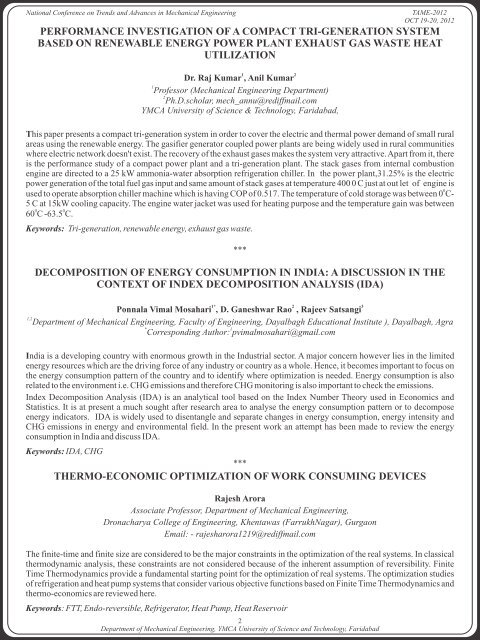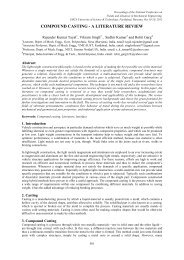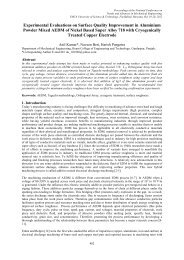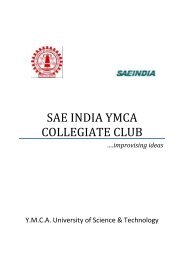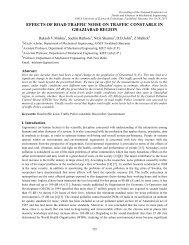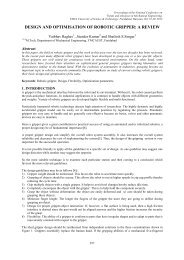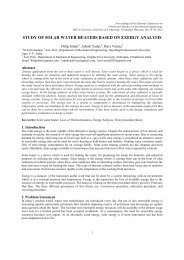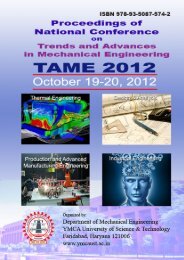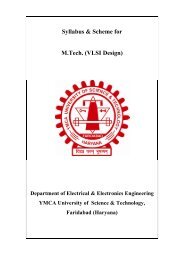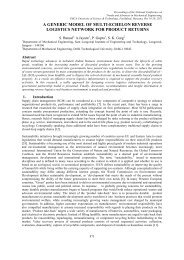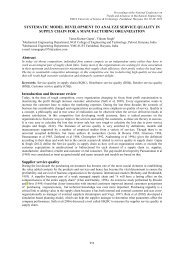Souvenir Containing Abstracts - YMCA University of Science ...
Souvenir Containing Abstracts - YMCA University of Science ...
Souvenir Containing Abstracts - YMCA University of Science ...
You also want an ePaper? Increase the reach of your titles
YUMPU automatically turns print PDFs into web optimized ePapers that Google loves.
National Conference on Trends and Advances in Mechanical Engineering<br />
PERFORMANCE INVESTIGATION OF A COMPACT TRI-GENERATION SYSTEM<br />
BASED ON RENEWABLE ENERGY POWER PLANT EXHAUST GAS WASTE HEAT<br />
UTILIZATION<br />
1 2<br />
Dr. Raj Kumar , Anil Kumar<br />
1<br />
Pr<strong>of</strong>essor (Mechanical Engineering Department)<br />
2<br />
Ph.D.scholar, mech_annu@rediffmail.com<br />
<strong>YMCA</strong> <strong>University</strong> <strong>of</strong> <strong>Science</strong> & Technology, Faridabad,<br />
This paper presents a compact tri-generation system in order to cover the electric and thermal power demand <strong>of</strong> small rural<br />
areas using the renewable energy. The gasifier generator coupled power plants are being widely used in rural communities<br />
where electric network doesn't exist. The recovery <strong>of</strong> the exhaust gases makes the system very attractive. Apart from it, there<br />
is the performance study <strong>of</strong> a compact power plant and a tri-generation plant. The stack gases from internal combustion<br />
engine are directed to a 25 kW ammonia-water absorption refrigeration chiller. In the power plant,31.25% is the electric<br />
power generation <strong>of</strong> the total fuel gas input and same amount <strong>of</strong> stack gases at temperature 400 0 C just at out let <strong>of</strong> engine is<br />
0<br />
used to operate absorption chiller machine which is having COP <strong>of</strong> 0.517. The temperature <strong>of</strong> cold storage was between 0 C-<br />
5 C at 15kW cooling capacity. The engine water jacket was used for heating purpose and the temperature gain was between<br />
0 0<br />
60 C -63.5 C.<br />
Keywords: Tri-generation, renewable energy, exhaust gas waste.<br />
***<br />
DECOMPOSITION OF ENERGY CONSUMPTION IN INDIA: A DISCUSSION IN THE<br />
CONTEXT OF INDEX DECOMPOSITION ANALYSIS (IDA)<br />
1* 2 3<br />
Ponnala Vimal Mosahari , D. Ganeshwar Rao , Rajeev Satsangi<br />
1,2<br />
Department <strong>of</strong> Mechanical Engineering, Faculty <strong>of</strong> Engineering, Dayalbagh Educational Institute ), Dayalbagh, Agra<br />
* 1<br />
Corresponding Author: pvimalmosahari@gmail.com<br />
India is a developing country with enormous growth in the Industrial sector. A major concern however lies in the limited<br />
energy resources which are the driving force <strong>of</strong> any industry or country as a whole. Hence, it becomes important to focus on<br />
the energy consumption pattern <strong>of</strong> the country and to identify where optimization is needed. Energy consumption is also<br />
related to the environment i.e. CHG emissions and therefore CHG monitoring is also important to check the emissions.<br />
Index Decomposition Analysis (IDA) is an analytical tool based on the Index Number Theory used in Economics and<br />
Statistics. It is at present a much sought after research area to analyse the energy consumption pattern or to decompose<br />
energy indicators. IDA is widely used to disentangle and separate changes in energy consumption, energy intensity and<br />
CHG emissions in energy and environmental field. In the present work an attempt has been made to review the energy<br />
consumption in India and discuss IDA.<br />
Keywords: IDA, CHG<br />
***<br />
THERMO-ECONOMIC OPTIMIZATION OF WORK CONSUMING DEVICES<br />
Rajesh Arora<br />
Associate Pr<strong>of</strong>essor, Department <strong>of</strong> Mechanical Engineering,<br />
Dronacharya College <strong>of</strong> Engineering, Khentawas (FarrukhNagar), Gurgaon<br />
Email: - rajesharora1219@rediffmail.com<br />
The finite-time and finite size are considered to be the major constraints in the optimization <strong>of</strong> the real systems. In classical<br />
thermodynamic analysis, these constraints are not considered because <strong>of</strong> the inherent assumption <strong>of</strong> reversibility. Finite<br />
Time Thermodynamics provide a fundamental starting point for the optimization <strong>of</strong> real systems. The optimization studies<br />
<strong>of</strong> refrigeration and heat pump systems that consider various objective functions based on Finite Time Thermodynamics and<br />
thermo-economics are reviewed here.<br />
Keywords: FTT, Endo-reversible, Refrigerator, Heat Pump, Heat Reservoir<br />
2<br />
Department <strong>of</strong> Mechanical Engineering, <strong>YMCA</strong> <strong>University</strong> <strong>of</strong> <strong>Science</strong> and Technology, Faridabad<br />
TAME-2012<br />
OCT 19-20, 2012


